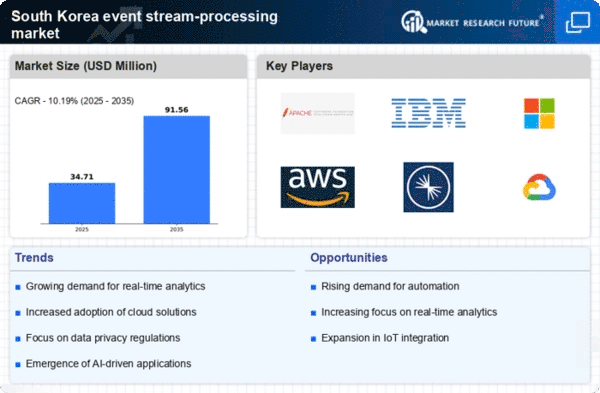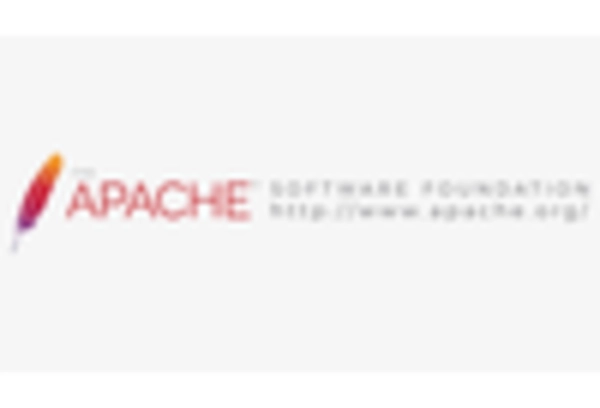Expansion of IoT Ecosystem
The proliferation of Internet of Things (IoT) devices in South Korea is a critical driver for the event stream-processing market. With millions of connected devices generating vast amounts of data, the need for robust event stream-processing solutions becomes increasingly apparent. In 2025, it is estimated that the number of IoT devices in South Korea will exceed 30 million, creating a substantial volume of data that requires real-time processing. This growth presents opportunities for the event stream-processing market to develop innovative solutions that can efficiently manage and analyze data streams from diverse IoT applications. As organizations strive to leverage IoT data for enhanced operational insights, the demand for event stream-processing technologies is likely to escalate.
Advancements in Cloud Infrastructure
The event stream-processing market in South Korea is greatly influenced by advancements in cloud infrastructure. As organizations increasingly migrate to cloud-based solutions, the demand for scalable and flexible event stream-processing technologies rises. In 2025, cloud adoption in South Korea is expected to reach 80%, indicating a strong shift towards cloud-native architectures. This transition presents opportunities for the event stream-processing market to develop solutions that leverage cloud capabilities for enhanced performance and scalability. Companies are likely to seek event stream-processing technologies that can seamlessly integrate with their cloud environments, facilitating efficient data management and analysis.
Growth of E-Commerce and Digital Services
The rapid expansion of e-commerce and digital services in South Korea serves as a significant catalyst for the event stream-processing market. As online transactions and digital interactions continue to rise, businesses require advanced event stream-processing capabilities to manage and analyze customer data in real-time. In 2025, the e-commerce sector is projected to reach a market value of over $50 billion, underscoring the necessity for efficient data processing solutions. The event stream-processing market is likely to thrive as organizations seek to enhance customer experiences through personalized services and timely responses, driven by insights derived from real-time data.
Regulatory Compliance and Data Governance
In South Korea, the event stream-processing market is significantly influenced by the need for regulatory compliance and data governance. As data privacy regulations become more stringent, organizations are compelled to adopt technologies that ensure compliance while managing data streams effectively. The event stream-processing market is poised to benefit from this trend, as companies seek solutions that not only facilitate real-time data processing but also adhere to legal requirements. In 2025, it is anticipated that investments in compliance-related technologies will increase by 20%, further driving the demand for event stream-processing solutions that can integrate compliance features seamlessly.
Rising Demand for Real-Time Data Processing
The event stream-processing market in South Korea experiences a notable surge in demand for real-time data processing solutions. As businesses increasingly rely on instantaneous insights to drive decision-making, the need for efficient event stream-processing technologies becomes paramount. In 2025, the market is projected to grow at a CAGR of approximately 15%, reflecting the urgency for organizations to harness real-time data. This trend is particularly evident in sectors such as finance and telecommunications, where timely information can significantly impact operational efficiency and customer satisfaction. The event stream-processing market is thus positioned to benefit from this growing demand, as companies seek to implement solutions that facilitate rapid data ingestion and analysis.

















